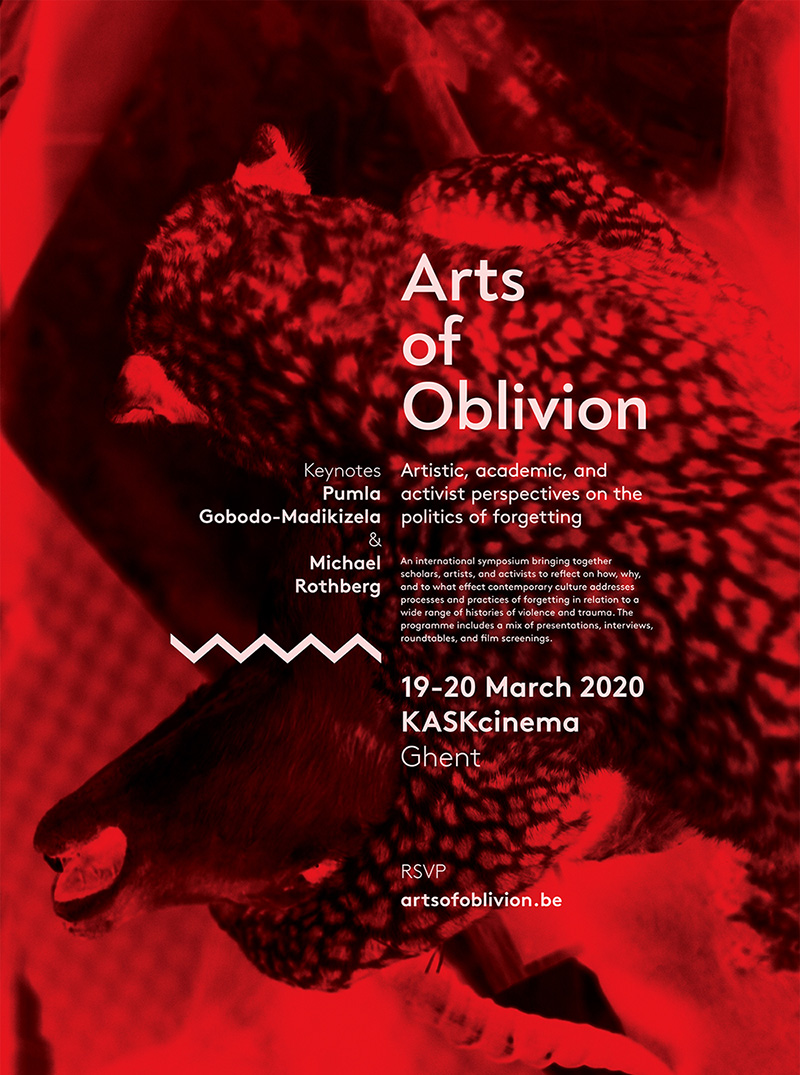
“Arts of Oblivion” Symposium – POSTPONED
Artistic, academic, and activist perspectives on the politics of forgetting
Keynotes: Pumla Gobodo-Madikizela and Michael Rothberg
Participants: Joachim Ben Yakoub, Branka Benčić, Stoffel Debuysere, Oliver Frljić, Quinsy Gario, Carole Umulinga Karemera, Eline Mestdagh, Anna Reading, Selma Selman, Reem Shilleh, Christel Stalpaert, Matthew Stanard, Vesna Teršelič, Sarah Vanagt, and others
Organizers: Jelena Jureša, Marte Van Hassel, and Stef Craps
Event dates: 19-20 March 2020 POSTPONED – DATES TO BE ANNOUNCED
Location: KASKcinema, Godshuizenlaan 4, 9000 Gent
Programme and registration: www.artsofoblivion.be
In recent years theorists and practitioners of memory have increasingly turned their attention to memory’s “other,” forgetting or oblivion. At best a secondary concern during the “memory boom” of the 1980s and 1990s, the phenomenon of forgetting commands widespread interest these days, not only in academic circles but also in the art world and across society.
Prominent memory scholars such as Paul Connerton, Aleida Assmann, and Paul Ricœur insist on the need to differentiate between different types or forms of forgetting, some constructive, others destructive. The anthropologist Ann Laura Stoler has famously put forward the concept of aphasia as an alternative to forgetting to describe European nations’ problematic relationship with their respective colonial histories. In a much-talked-about book, the journalist David Rieff provocatively calls for a rehabilitation of forgetting as a worthy pursuit. Memory loss is being studied as a major symptom of dementia, arguably the signature illness of this era of big data and information overload, which could yet become known as a “digital Dark Age” to future historians due to the ephemerality of born-digital materials. Responding to what seems to be the opposite fear, a ruling by the European Court of Justice has enshrined a “right to be forgotten” in EU law, giving EU citizens the right to have their personal data erased under certain circumstances. Meanwhile, numerous artists and activists have been investigating, documenting, and protesting processes and practices of forgetting, erasure, denial, and repression, often in response to official attempts to impose a hegemonic version of a contested past and to suppress, silence, or marginalize dissenting voices.
Featuring keynote lectures by Pumla Gobodo-Madikizela and Michael Rothberg, the international symposium “Arts of Oblivion” will bring together scholars, artists, and activists to discuss how, why, and to what effect contemporary culture addresses issues of forgetting in relation to a diverse range of individual as well as collective histories of violence, trauma, and illness. The programme will include a mix of presentations, interviews, roundtables, and film screenings, and allow ample time for discussion and interaction.
Attendance is free, but registration is required. All participants, both speakers and attendees, should register via the symposium website by 10 March 2020 at the latest.
